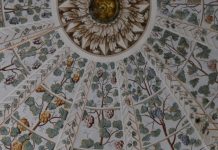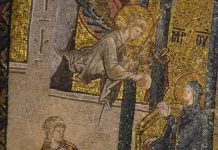I will dwell for a few moments on this affair and the reasons for it. It was mid-day, and the emperor was suffering from a recurrence of his illness, a more than usually violent attack. Believing that he was about to die almost at once, he sent for Ducas, gave him a verbal assurance that he was the new emperor, and openly entrusted to his care those whom he held most dear, his wife and daughter, his brother and the rest of his family. The insignia of the sovereign were not yet handed over to Constantine, but the promise was explicit.
Later, the emperor recovered somewhat, and as it appeared that he was now restored to his normal health, he regretted his previous action, while Constantine, after being promoted to the throne, now found himself in a dangerous and embarrassing position. Not only was he afraid that his hopes were confounded, but he was fearful of the misfortune and the suspicion that might follow his collapse. So, abandoning all others, he took counsel with me, in the name of our old friendship. Whatever I proposed to do, whatever initiative I took, he was prepared, he said, to follow without hesitation.
Divine, spotless soul (I am moved to write as though you indeed heard me), I did not fail you. My friendship was true. You know yourself how from the very start I stood by you, how I encouraged and upheld you, how I cheered you in moments of despair, how I promised, if need arose, to share your perils, how I won over to your side the Patriarch, satisfied all the demands of friendship, allowed no opportunity to dip.
Constantine in the imperial insignia
To complete the story, the emperor was seized with a worse attack and everyone despaired of his life, but nobody at all, except myself, dared to array Constantine in the imperial insignia. I spoke out freely and seated him on the imperial throne, putting on his feet he sandals of purple — the sandals hitherto denied to him — and the Senate gave its unanimous approval. The other ceremonies followed, the meeting of the magistrates, their presentation to the sovereign, the homage due to an emperors the prostration, and all the formalities usually observed when a new ruler is proclaimed.
When he saw me leading the act of homage, he at once rose from his throne and openly embraced me, his eyes filled with tears. He was quite overcome, and the favours he then promised in his great thankfulness were more than he could ever have fulfilled — though he did carry into effect most of them.
Read More about Impartiality led to the disclosure of secrets








